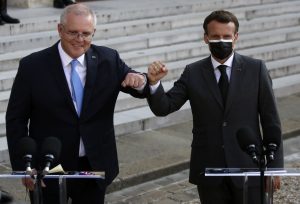Two weeks ago, France and Australia inaugurated their first 2+2 ministerial dialogue. This strategic partnership was based on a common analysis of the dangers weighing on the Indo-Pacific with an increasingly aggressive China in the maritime domain. This shared vision, which reflects France’s commitment in Asia, had been developed since 2016 around the supply of 12 French conventional submarines to Australia – at the time, the Australians rejected any idea of nuclear propulsion – but went far beyond that sole industrial interest.
In 2018, it was in Australia that French President Emmanuel Macron gave a decisive impetus to the French Indo-Pacific strategy in a famous Garden Island speech where he defined an “Indo-Pacific axis” formed by France, India, and Australia to counterbalance Chinese hegemonic ambitions. This Indo-Pacific vision was inclusive and cooperative, seeking to bring together middle powers worried by the unilateralism of the Trump administration then in power in the United States. At that time, Canberra itself was reluctant to get too deeply involved in the Quad, the Quadrilateral Security Dialogue, bringing together Australia, India, Japan, and the U.S.
As soon as it was signed, the Franco-Australian submarine contract came under attack. Yet, for all those parties – notably the United States and Quad members, but also Southeast Asian countries – who want to see the European Union and France assume greater responsibilities in the regional security of an area vital to all, this contract was an assurance of French Indo-Pacific commitment. Defense Ministers Jean-Yves Le Drian and Florence Parly, who participated in all Shangri-la strategic dialogues since 2012, have been at the forefront of those who defend freedom of navigation, respect for the rule of law, and multilateralism, values constantly put forward by Washington and its allies, including Japan. France was the driving force behind the definition of a European Union strategy for the Indo-Pacific – the publication of which, by an unfortunate coincidence, came the day after Australia announced that it was abandoning the French submarine contract.
Some see Canberra’s decision as a welcome re-emergence of an alliance between the traditional maritime powers of the United States, Australia, and the United Kingdom, in a nostalgic return to the past. Things have changed, however. The Afghan fiasco has shown the limits of U.S. commitment and its effectiveness, despite considerable resources. London, for its part, is desperately trying to find a new place on the international stage after Brexit by relying on the concept of “Global Britain.” One may wonder, however, about the reality of British capacities to project forces and capacities in the Indo-Pacific while the country is facing post-Brexit economic cost and tensions in its own territory. And contrary to what Joe Biden may think, today the U.K. is no longer Europe.
By comparison, France has permanent political and military assets in the Indian Ocean and the South Pacific. In recent years, the level of activity of its navy has been important, supplemented by regular naval deployments, including the Charles de Gaulle, and the organization of exercises with the Quad navies. These maritime capabilities are far from negligible in a region marked by tensions over maritime borders, piracy, illegal fishing, and frequent natural disasters.
As far as Australia is concerned, it is understandable that Canberra wants to acquire more powerful capacities to confront China, but within what timeframe and at what cost? It is not certain that the question of nuclear fuel for the submarines promised by the Americans can be easily resolved, since Australia itself does not produce it. Moreover, this nuclear dimension does not seem to be appreciated by its close neighbors, New Zealand, Indonesia and the Pacific island states, which are very sensitive to these issues. The U.S. Senate itself could oppose the transfer of technology.
What is more, the announcement was surprising in its brutality and its apparent lack of consultation. One wonders about the meaning of the message heedlessly sent to France. Is it a warning to a country that constantly emphasizes the need for Europe to think about its own interests and defense? Are Washington and its new “favorite” allies aware of the message sent to China, which may be worried about this coalition but will be quick to point out and exploit tensions and differences between Washington and its partners? Without doubt, it will become more difficult for those who defend an alliance of democracies against China to collaborate with a U.S. administration whose methods are abrupt, including with regard to its own camp. These maneuvers could also nourish the debate about the assurance of all U.S. engagements.
Washington was perhaps seeking to erase the damaging impression left by its chaotic withdrawal from Afghanistan by quickly displaying the Indo-Pacific shift in its policy. However, this posture risks discouraging the efforts of those in Paris and Brussels who are defending the importance of the Indo-Pacific as a legitimate and vital theater for France and the European Union foreign strategy. By cutting France out of the submarine deal with Australia, AUKUS could end up bolstering the position of those who consider the region too far away and China to big a partner to risk.

































